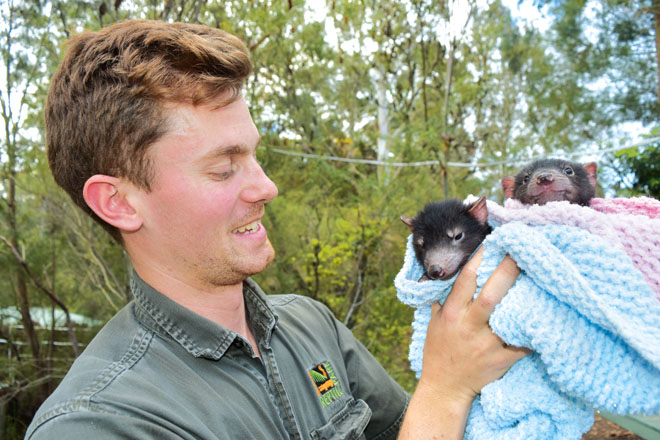Ever wondered what it would be like to look after animals all day, every day? Mammal and bird keeper Andrew Daly from the Australian Reptile Park tells Lauren Clarke more about what this job entails.
PETS: What is your role at the Australian Reptile Park?
Andrew: I’m a mammal and bird keeper. That means I look after all the birds and all the mammals, but it involves so much more, too, for example cleaning, gardening, researching diets and other needs for the animals, ordering food and materials, exhibit design and maintenance, doing shows and presentations, customer service and interacting with the media. A zookeeper is basically 10 or more different jobs rolled into one.
PETS: What is a typical day for you at work?
Andrew: On a typical day, the first thing I do is weigh and feed any sick, injured or baby animals we might have. Then the team will get together and go on morning rounds — cleaning all the exhibits and feeding the animals. The middle of the day is the time that’s most variable, but there’s always lots to do — preparing the animals’ food for the afternoon and next morning, giving educational talks, cleaning dishes, having meetings and (my favourite) feeding the koalas! Then in the afternoon we feed all the animals again, lock up all the exhibits and clean all our behind-the-scenes areas before heading home (and sometimes taking baby animals home to look after overnight).
PETS: What sort of study or work experience helped you to gain this role?
Andrew: Every zookeeper seems to have taken a different path to get their job. I studied a bachelor of science at university and completed an honours year researching interactions between Australian predators and prey. After I finished uni, I started volunteering at the Australian Reptile Park to gain hands-on experience with animals and worked my way up to where I am now.
PETS: What are some of the best parts of the job?
Andrew: The animals, obviously! I’m very lucky that I get to work with some unique and endangered Australian animals and sometimes even hand-raise them! Spending that extra time looking after an animal gives you a special bond with them. We also do enrichment with them — basically coming up with fun and exciting ways to entertain our animals. Coming up with ideas and seeing the animals enjoying their enrichment is always a lot of fun.
PETS: And what about the more challenging aspects?
Andrew: Zookeepers work outside rain, hail or shine. Working on 40-degree days in summer or cold, rainy days in winter is always difficult. Unfortunately, it’s a reality that sometimes animals get sick, injured and die from illness or old age. It’s always difficult to see an animal you’ve known for a long time when they’re sick or getting old.
PETS: Working in a field such as this, would you say it’s important to love animals?
Andrew: It’s definitely important to love animals! It’s not just important that you love learning and seeing and playing with animals, but you have to love the individuals enough to do all the jobs that aren’t as much fun — picking up poo, starting work very early in the morning or finishing very late, and generally running around trying to meet their every need.
PETS: What advice would you give to anyone looking to work in a position such as yours?
Andrew: The best advice I can give is to get as much experience working with animals as you can, as soon as you can. Whether that’s working at a pet store, volunteering at a vet or zoo, nothing is as valuable as practice and experience.


Leave a Reply